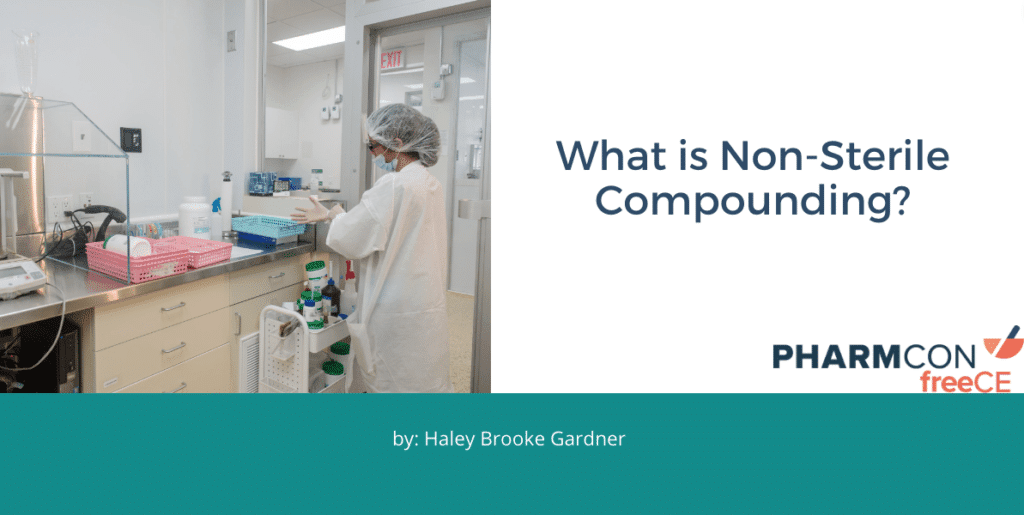What is Non-Sterile Compounding?
Non-sterile compounding refers to pharmacy personnel’s preparation of customized medications such as oral products, creams, ointments, and suppositories. The compounding process refers to the manipulation and combining of medications to create specific formulations for individual patient needs. For pharmacy technicians, this practice requires specialized training and adherence to quality control measures set by the United States Pharmacopeia (USP) to ensure the safety, efficacy, and stability of the compounded products.
Table of Contents
Compounding Pharmacy Incident: Non-Sterile, Non-Compliance
Pharmacy staff have a crucial responsibility to ensure the quality of compounded medications for their customers. While we often hear about incidents involving sterile compounding, it’s important to also address the risks associated with non-sterile compounding. One such incident occurred at a compounding pharmacy in Texas.
In September 2015, a pharmacy technician was tasked with compounding a batch preparation of 480 mL of lansoprazole 3mg/mL suspension. Unfortunately, lorazepam was used instead of the intended medication. Consequently, three pediatric patients received the incorrect medication from the pharmacy, leading to adverse events. One of the children required emergency care and was taken to the ER.
While no long-term side effects or fatalities were reported, it is crucial to acknowledge that the situation could have had far more severe consequences. So, what caused this unfortunate incident?
The pharmacy technician involved failed to maintain accurate records for the compounding of this specific batch preparation. Furthermore, she forged the initials of another pharmacy technician, falsely indicating completion of a process check.
This incident highlights the need for pharmacy technicians to undergo comprehensive training in non-sterile compounding, including staying updated with the latest revisions in USP 795 guidelines. Accurate record-keeping, adherence to protocols, and continuous education are vital to safeguard patient well-being and ensure the quality of compounded medications. This incident serves as a reminder of the importance of maintaining strict standards to mitigate risks and prioritize patient safety in pharmacy compounding practices.
USP Chapter 795 Updates Effective November 2023, What’s New?
On November 2023, the United State Pharmacopeia (USP) will begin to implement significant updates to Chapter 795, impacting the practice of non-sterile compounding. These revisions aim to improve quality assurance and enhance patient safety. So, what do pharmacy technicians need to know about the new update?
1. Training and Competencies:
The 2023 update addresses the need for specific training requirements in compounding practices. According to the revised chapter, all personnel must undergo initial training and demonstrate competency based on defined requirements. Core competencies include understanding Chapter 795 requirements, interpreting safety data sheets and certificates of analysis, and comprehending compounding duties and procedures. Personnel are also required to demonstrate this knowledge every 12 months thereafter, ensuring ongoing competence.
2. Personal Hygiene and Garbing:
To minimize the risk of contamination, personnel with potential sources of contamination, such as rashes, open wounds, or recent tattoos, must now inform the designated responsible person. Additionally, the use of gloves is now mandatory for all compounding procedures, replacing the previous “as needed” approach.
3. Monitoring and Cleaning:
The updated USP Chapter 795 provides a table outlining the recommended frequency for cleaning and sanitizing work surfaces, floors, walls, and ceilings. This guidance ensures that compounding environments remain clean and free from potential contaminants.
4. Equipment and Components:
The revised chapter introduces new guidelines related to equipment and components used in compounding. These guidelines address the proper maintenance, cleaning, and use of equipment to ensure quality and consistency in compounded preparations.
5. Master Formulation Compounding Records:
While it was previously recommended to create a Master Formulation Record (MFR) before compounding a preparation for the first time, the updated USP795 now mandates the recording of both MFRs and Compounding Records (CRs) for every new batch. This documentation promotes accurate record-keeping and traceability in the compounding process.
6. Beyond-Use Dates:
The term “water-containing” preparations has been removed from Chapter 795, and the concept of water activity levels has been introduced to determine appropriate Beyond-Use Dates (BUDs) for compounded preparations. This update aligns with evolving scientific knowledge and ensures the stability and safety of compounded products.
Because the USP Chapter 795 updates become effective November 2023, we are introducing a program that will prepare pharmacy technicians for these changes, enabling them to stay compliant with the evolving requirements. By enrolling in our certificate program, pharmacy technicians can ensure they are well-prepared to meet the highest standards of quality and patient safety in non-sterile compounding practices.
Introducing Our New Pharmacy Technician Compounding Training Certificate Program
This program is designed to be an additional resource for certified pharmacy technicians to avoid incidents of non-compliance and to keep pharmacy personnel up to date on everchanging USP requirements. Accessible on-demand from any device, this comprehensive and flexible training offers instant reporting to accrediting bodies, meeting state and national requirements.
What’s Included in Our Course?
Enrolled technicians will explore the significance of the USP Chapter 795 and gain a thorough understanding of its implications in non-sterile compounding. The program covers requirements and guidelines outlined in the 503A/503B compounding regulations and the USP Chapter 800, enabling technicians to navigate complexities.
An integral part of the program focuses on equipping technicians with precise terminology relevant to non-sterile compounding. Fluency in this language facilitates effective communication with colleagues, regulatory bodies, and other stakeholders. Insights into oversight organizations within the compounding industry are also provided.
Pharmaceutical calculations receive significant attention in the program, empowering technicians to measure and prepare compounded medications accurately. Proficiency in dosage calculations, drug concentrations, and dilutions enhances precision.
Additionally, the program covers drugs commonly used in non-sterile compounding, stability and compatibility considerations, necessary supplies and equipment, and proper utilization and maintenance of compounding equipment. Best practices for decontamination and sanitization are taught, along with the importance of personal protective equipment.
Technicians learn about measuring procedures to ensure desired strength and formulation. Review processes minimize errors, prioritizing patient safety.
Quality assurance and control are emphasized, ensuring technicians understand the importance of maintaining high standards and monitoring compounded preparations. Our program equips pharmacy technicians with the skills and knowledge necessary for safe and effective non-sterile compounding practices.
References:
- American Society of Health-System Pharmacists. (2023). USP <795>: Key Changes. Retrieved from https://www.ashp.org/-/media/assets/pharmacy-practice/resource-centers/compounding/docs/USP-795-Key-Changes.pdf
- Texas State Board of Pharmacy. (2016). Greenpark Compounding Pharmacy ABO. Retrieved from https://www.pharmacy.texas.gov/abo/detail/271550%20%20P14713%20%20Greenpark%20Compounding%20Pharmacy%20ABO%20%20H16006%20%202016-11.pdf






